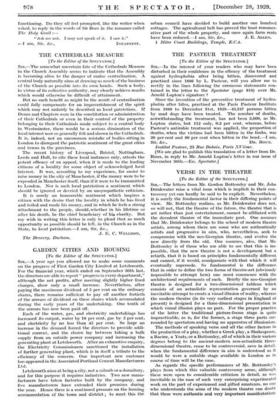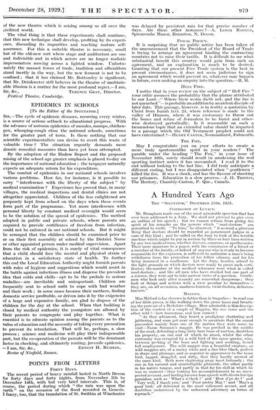VERSE IN THE THEATRE
[To the Editor of the SPECTATOR.] SIR,—The letters from Mr. Gordon Bottomley and Mr. John Drinkwater raise a vital issue which is implicit in their con- troversy yet can hardly be said to be explicit. Nevertheless, it is surely the fundamental factor in their differing points of view. Mr. Bottomley realizes, as Mr. Drinkwater does not, or will not, that the theatre of the future, the theatre that is art rather than just entertainment, cannot be affiliated with the decadent theatre of the immediate past. One assumes that Mr. Drinkwater belongs to the school of modern theatre artists, among whom there are some who are authentically artists and progressive in aim, who, nevertheless, seek to compromise with the neo-Georgian theatre, and evolve the new directly from the old. One assumes, also, that Mr. Bottomley is of those who are able to see that this is im- possible, that the new theatre is not a development but a rebirth, that it is based on principles fundamentally different and cannot, if it would, amalgamate with that which it will eventually supersede. So fundamental is the difference that in order to define the two forms of theatre-art (obviously impossible to attempt here) one must commence with the architectural requirements of each. Briefly the neo-Georgian theatre is designed for a two-dimensional tableau which consists of an actualistic representation governed by an inevitable attempt to create a visual illusion of reality, whereas the modern theatre (in its very earliest stages in England at present) is designed for a three-dimensional presentation in which visual illusion plays no part. For the proper practice of the latter the traditional picture-frame stage is quite impracticable, as is, for the former, a stage three parts sur- rounded by spectators and having no apparatus of illusionism.
The methods of speaking verse and all the other factors in the production of a play, whether a Greek play, a Shakespeare, a Racine, a Yeats, or a Bottomley, all of which in their various degrees belong to the ancient-modern non-actualistic three- dimensional theatre, cease to be controversial, save in detail, when the fundamental difference in aim is understood as it would be were a suitable stage available in London as in course of time will be the case.
As regards the specific performances of Mr. Bottomley's
plays from which this valuable controversy arose, although these were open to considerable criticism in detail, as was inevitable in the case of such very enterprising experimental work on the part of experienced and gifted amateurs, no one who understands the aims of the modern theatre can doubt that these were authentic and very important manifestations of the new theatre which is arising among us all over the civilized world.
The vital thing is that these experiments shall continue, that this new technique shall develop, profiting by its experi- ence, discarding its impurities and reaching mature self- assurance. For this a suitable theatre is necessary, small but of the old-new sort where stage and auditorium are one and indivisible and in which actors are no longer realistic impersonators moving across a lighted window. Unfortu- nately the massed forces of trade, tradition and officialdom stand inertly in the way, but the new ferment is not to be confined ; that it has claimed Mr. Bottomley is significant, that Mr. Drinkwater still believes in the theatre of unobtain- able illusion is a matter for the most profound regret.—I am, Sir, &c., TERENCE GRAY, Director. Festival Theatre, Cambridge.

































 Previous page
Previous page